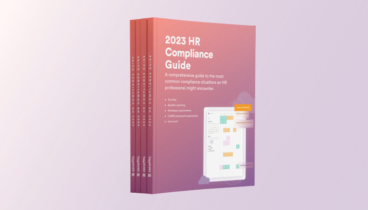HR departments aren’t just responsible for recruiting and benefits — they ensure companies meet their legal obligations when it comes to compliance, inside of the HR function and out.

Here's what you need to know:
-
HR is responsible for making sure the company meets its legal obligations when it comes to compliance, inside of the HR function and out
-
Some requirements are ensuring workplace safety, compliance with data security regulations, and general business compliance like ACA reporting
-
Common issues that cause businesses to be out of compliance fall under areas like data security, discrimination, and harassment
To keep your business operating successfully, small business owners everywhere are responsible for remaining compliant with a host of laws, restrictions, and regulations on the state, federal, and international levels. No easy feat!
These responsibilities usually fall to HR, and cover everything from employment laws to worker safety to mandated business filings.
What is HR compliance?
HR is responsible for making sure the company meets its legal obligations when it comes to compliance, inside of the HR function and out. Human resource compliance centers around the practices related to attracting, recruiting, hiring, and onboarding, as well as employee relations.
HR compliance covers:
- Payroll
- Risk and safety
- Benefits
- Hiring
- Employee relations
- Termination
What’s HR’s role in compliance?
HR functions as the people center of a business but is also key to the compliance architecture of the company. While HR departments must remain compliant with all the laws and regulations pertaining to HR operations — like fair recruiting practices — the department also ensures compliance with other specific non-HR requirements.
Some of these requirements are:
- Ensuring workplace safety requirements as defined by the Occupational Safety and Health Association and keeping up with the various worker safety legislative changes
- Compliance with data security regulations like GDPR, the California Consumer Protection Act, and HIPAA requirements. HR is the function that handles the most personal components of employee data
- General business compliance like Affordable Care Act reporting, quarterly and accurate tax filings, anti-discrimination laws, and wage and hour laws
Like we said earlier, this is no easy feat — especially for small business owners. SBOs often lack the resources needed to hire a full HR department, but don’t have the time to become experts themselves. Yet being out of compliance means your business risks hefty fines, liability, and damage to your reputation, which is all far more costly than investing in the resources to stay on top of compliance.
Being out of compliance means your business risks hefty fines, liability, and damage to your reputation, which is all far more costly than investing in the resources to stay on top of compliance.
Common legal compliance issues HR departments face
Compliance is tricky because some requirements are easy to confidently meet, like paying state and federal minimum wage. Others are much more complex, like the changes to employee classification from California’s AB5. This makes it hard for small businesses to make sure they’re compliant with all the boxes they have to tick.
Some of the most common issues that cause businesses to be out of compliance fall under the following laws, acts, and requirements.
Fair Labor Standards Act
Federal law that establishes minimum wage, overtime pay, equal pay, record keeping, and child labor standards for employees. HR is responsible for differentiating between exempt and nonexempt employees, tracking entitlements, and overtime pay. Class action lawsuits are commonly brought against businesses for violating FLSA.
Data security
GDPR and CCPA don’t only apply to consumer data, they govern employee data as well. HR must get permission to use employee data, be transparent about how it’s used, and have systems in place should employees withdraw permission.
Discrimination
Companies are legally barred from discrimination on the basis of race, color, religion, sex and national origin under Title VII of the Civil Rights Act. But beyond avoiding discrimination, smart businesses today are making diversity a major emphasis of their hiring processes and reaping impressive benefits. Also, it’s just the right thing to do.
Affordable Care Act
The ACA has a number of mandates that affect small businesses. Of note is the providing Summary of Benefits Coverage to all employees or risking facing a penalty for noncompliance.
Harassment
Harassment comes in a few forms, and it’s all bad. Whether sexual harassment or bullying, it’s HR’s responsibility to take an employee’s complaint seriously — or risk lawsuits, damage to the company’s standing, and bad karma.







